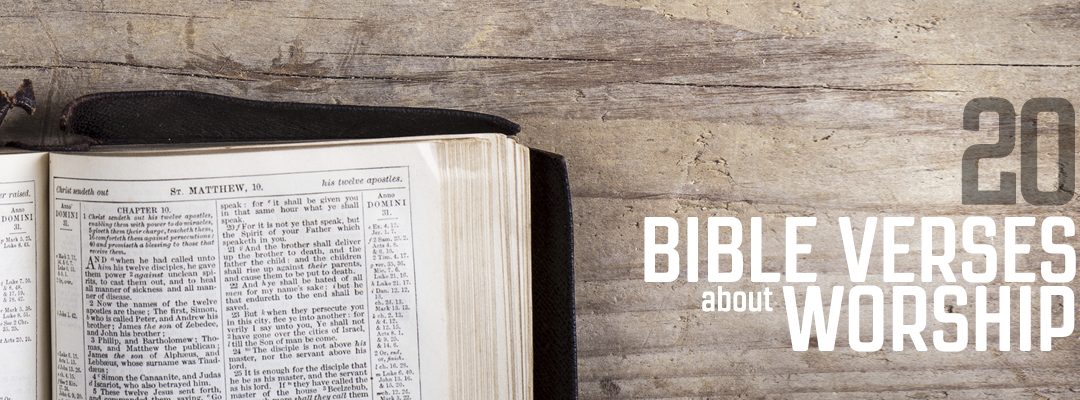A worship leader’s platform carries with it many unique aspects that are unlike any other stage for a musician. Here are a few practical tips to ensure the focus is in the right place.

1. Be prepared spiritually.
We have the awesome responsibility of leading God’s Church into His presence, so we should try to live our lives worthy of the calling God has placed on us and take care of those He has entrusted to us. It’s not about being perfect—because no one is—but it is about examining our hearts, continually striving to walk with God, and laying down our own selfish desires. We should be genuinely seeking the heart of God both on and off the stage.
And speaking of the stage, it’s important to remember that everyone on stage is a worship leader—not just the pastor or the one holding an acoustic guitar :). While we shouldn’t have an expectation that just because someone is on stage they have it all together, we are called to be leaders and we should take that seriously. As the popular adage goes, “you can’t lead someone where you haven’t already been.” So make sure that your heart is right, your motives are pure, and that you have spent time alone with the Lord before you step up to lead people before His throne.
2. Be prepared musically.
When you show up to run through the songs with the other musicians and vocalists—whether it’s on Sunday morning or rehearsal day—it’s time to literally ‘run through’ the songs… NOT to actually learn them! In most cases, the best thing you can do to serve the team and the songs is to learn the exact parts from the recordings. After all, these parts are what make the songs recognizable to the congregation who will be singing them. There are many online resources available today to learn parts, and if you use Worship Band in Hand, you can listen to each individual instrument and play along with the band tracks. Take time on your own to listen to the set on repeat, practice with your instrument, or even chart out your parts. By doing these things, you respect the time of your teammates.
Worship Leaders: To honor your team’s time together, you should have the set list and materials prepared as far before Sunday (or your scheduled rehearsal time) as possible. To set the team up for success, you should know ahead of time what keys you want the songs in, the ‘roadmap’ order you’ll sing them in, and any special moments you need to lead the band through. This doesn’t necessarily mean that you’re locked in, it just means that you have a well thought out starting point. If you can get everyone on the same page to begin with, you can then adjust together. And that brings us to the next tip…
3. Be flexible.
One of the primary benefits of being prepared musically is that it provides the freedom to break out of the pattern when necessary. If your team barely knows the songs, and they’re not confident on their instruments, it really limits what you can do. You risk a train wreck if you veer off course. On the other hand, if the team is skilled and has invested the time with their instruments and the songs, they can be flexible to follow where the Holy Spirit leads in the moment.
Some of the most powerful times of worship are when we throw out the run sheet, turn off the click track, and sing a new song to the Lord! As worship leaders, we need to be open to what God wants to do in our worship sets and not become confined to a strict play order down the page. But to do this we must be skilled in our craft so that our abilities (or lack thereof) don’t restrict how we flow in worship.
Take the time to master your instrument. Listen to worship music on your own. Learn ALL the songs your team might lead. Learn the number system and be able to transpose on the fly. Worship leaders, talk with your team about how you’ll communicate with them when the plan is being changed on the fly. Planning to be flexible will help your team remain unified and lead worship well together.
4. Be connected.
As musicians, sometimes it’s easy to fly under the radar. Though we spend a lot of time at church, we can become isolated and get a free pass because of what we do. Instead, we should be intentional about connecting with the congregation apart from our worship times. When church members realize that those of us on stage are real people who are participating in church life and even serving in other ways, it earns their trust. When they get to know us, they’ll be much more willing to follow us into vulnerable moments of worship in God’s presence.
We should also stay connected to the global worship community. If all we know is our own church, we are missing out. We should connect with other worship leaders and musicians, whether from the church across town, or by attending conferences at the regional or national level. We should seek opportunities to grow in our relationship with God and in our skills as worship musicians. We can learn so much from what’s going on in the global context of the Church. New songs are being birthed, and new movements are being created. We should explore how we can best serve our local communities by integrating these expressions of worship.
5. Be practical.
I’ve learned that simple things done with excellence are much better than elaborate ones that result in disaster. That holds true with everything from AVL production down to gear like an electric guitar player’s pedalboard. If you ask some of the world’s best worship musicians, they’ll often share that they’re not always chasing the latest thing, but sticking with what they know works well. This is also great news for your budget!
Before you spend more money on the latest and greatest gear, invest the time to master the tools that you already have. This does NOT mean that we should be stagnant and never upgrade or fix what’s broken. When we do invest, however, the skills we have honed will then help us choose quality items and steward them well.
These are just a few reminders that we should be conscious of as we fulfill our role in the body of Christ as worship musicians. Please stay connected with us as we dive further into resourcing worship teams on the Worship Band in Hand platform this year!

David manages the operations of Worship Band in Hand as well as travels as a keyboard player and audio tech for his wife, Jenna Grace May. He is also a producer at WorshipCo and has many years of experience in both staff and traveling worship and church production settings.












